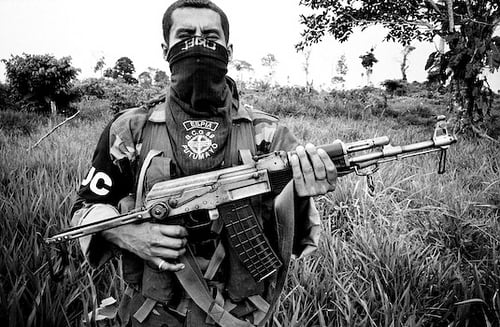David Gomez*, 27, is from the Department of Cordoba, a province on Colombia's Caribbean coast in the north of the country, but he now lives in Bogota, the capital. He joined the AUC (Autodefensas Unidas de Colombia), Colombia's largest illegal paramilitary group, when he was 15 and stayed with the group for nine years. He talked to IRIN/PlusNews about the difficulty of adjusting to civilian life after he left the group, and the discovery that he had contracted HIV.
"I joined for vengeance. I was abused as a child; I lived with my grandparents and if I misbehaved they beat me and cut me with a machete. I just had more and more anger the older I got.
"When I was 15, I went to stay on my uncle's farm and he was involved in the AUC. I didn't know what it was at the time but after they explained it me, I wanted to join. Before they accepted me, they said I had to train how to use a gun, so I trained for three months. I never went to school; I only studied in the AUC about how to make bombs and stuff.
"After that, it was combat and I didn't have time for regrets. In my unit there weren't any women and I never had any girlfriends, but at the weekends most of us would go drinking and we'd pay for prostitutes.
"They taught us about using condoms. You had to take care of yourself because they didn't accept people who were HIV positive. There was one time when the commander of our unit decided we all had to test for HIV. Fifteen men were infected and they shot them and burned the bodies. After that, the commander only brought over prostitutes who had proof they'd tested negative.
"After demobilising it was very hard to adapt. I wasn't used to people treating me nicely, and treating others nicely, and I had to think about what I was going to do with my life. I started drinking a lot and going to prostitutes; I think that's when I became infected.
"I got TB and that's when I discovered my status. I didn't know what to do, but I stopped drinking and I met my wife soon after that. I used to lose my patience easily and get angry; that's when I used to drink. Now I breathe and count to 10. I've gone one year now without drinking.
"My wife knows my status and she's supportive. We take care of each other and I take my pills every night. I want to be a well-educated person so I can work, but I'm afraid that if people know I'm positive they won't give me a job."
*Not his real name
ks/he
See also: COLOMBIA: Potential AIDS fallout from armed conflict
This article was produced by IRIN News while it was part of the United Nations Office for the Coordination of Humanitarian Affairs. Please send queries on copyright or liability to the UN. For more information: https://shop.un.org/rights-permissions





